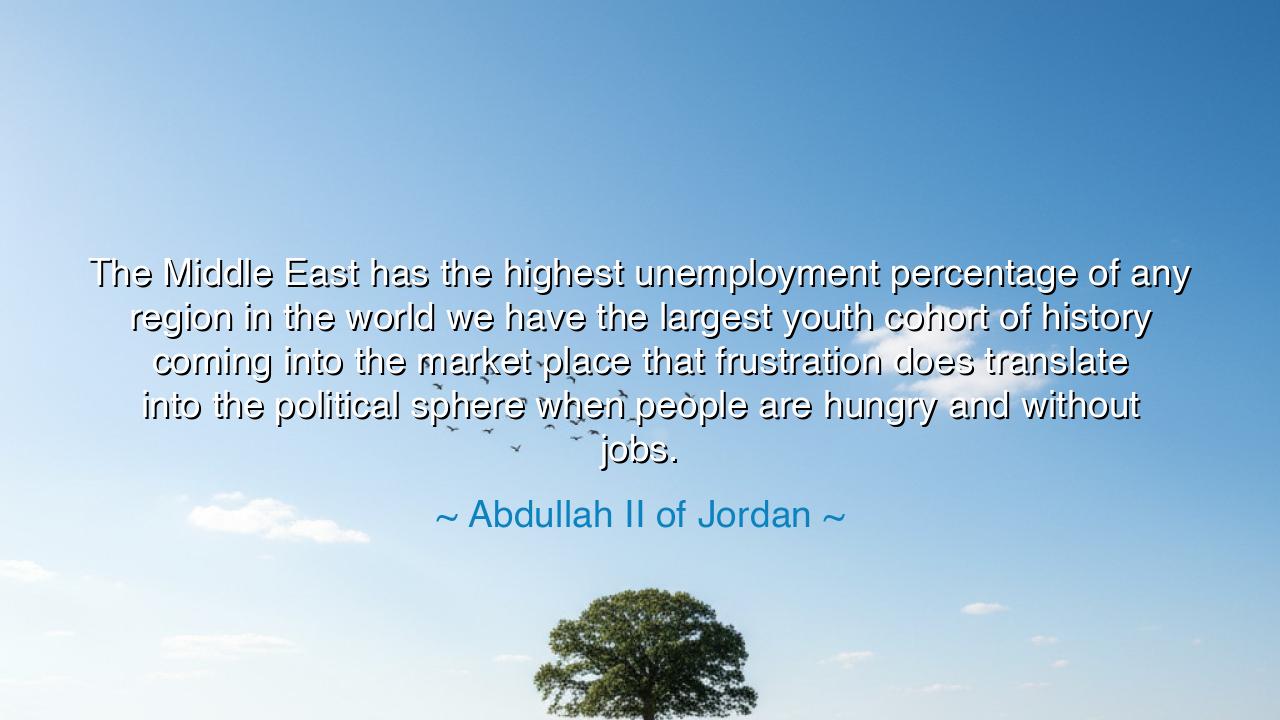
The Middle East has the highest unemployment percentage of any
The Middle East has the highest unemployment percentage of any region in the world we have the largest youth cohort of history coming into the market place that frustration does translate into the political sphere when people are hungry and without jobs.






King Abdullah II of Jordan, a leader forged in the storms of his region, once spoke with clarity and compassion: “The Middle East has the highest unemployment percentage of any region in the world. We have the largest youth cohort of history coming into the marketplace. That frustration does translate into the political sphere when people are hungry and without jobs.” These words, spoken not as mere observation but as warning, reveal an ancient truth dressed in modern form — that when the hands of youth are idle, the heart of a nation grows restless. In them, one hears the echo of civilizations past: the rise and fall of empires not because of invasion from without, but neglect from within.
The meaning of this quote runs deeper than the statistics it names. Abdullah speaks not only of economics but of human dignity, of the sacred balance between opportunity and despair. When a generation stands ready to build yet finds no foundation upon which to stand, the spirit begins to wither. Work is not merely labor; it is purpose, identity, belonging. To deny the young their rightful place in shaping the world is to plant seeds of frustration, and from that soil, unrest and division will surely grow. Hunger of the body leads to hunger of the soul, and where there is no bread, there can be no peace.
The origin of this thought lies in the lived reality of Abdullah’s kingdom and the wider Middle East — a region of vast potential and profound challenges. He has seen firsthand how economic stagnation and youth unemployment ignite political instability, how the fire of ambition, when trapped, becomes the fire of protest. In his words, one senses both a ruler’s worry and a father’s sorrow, for he knows that the energy of youth is like a river: when guided, it nourishes the land; when dammed, it floods and destroys.
History bears grim testimony to his warning. In the year 2011, the world watched as the Arab Spring swept across nations like a desert wind. What began as a cry for dignity and opportunity soon erupted into revolution. Millions of young people — educated, connected, but jobless — rose up not out of hatred, but of hopelessness. They were not seeking chaos, but a place in their own future. Yet when leaders fail to listen to the pulse of their people, the silence between them becomes unbearable, and that silence turns to roar. Abdullah’s words are thus both remembrance and prophecy — a reminder that economic justice is the foundation of political peace.
The ancients knew this truth as well. When Rome was prosperous, its citizens were loyal; but when famine and unemployment spread, rebellion followed swiftly. Bread and circuses were not mere distractions — they were symbols of a ruler’s duty to sustain both body and spirit. Likewise, the great Caliph Omar ibn al-Khattab once said, “If a single soul sleeps hungry under my rule, I am responsible before God.” He understood, as Abdullah does, that leadership is not the command of people, but the care of them. No civilization endures that ignores the cries of its youth.
Yet in this warning lies a call to action — not only for rulers, but for all who bear the power to create, to employ, to educate. Abdullah’s words implore us to invest in human potential, to see the young not as burdens, but as builders of destiny. A nation’s true wealth is not in oil or gold, but in its people’s minds, hands, and hearts. To nurture them is to secure the future; to neglect them is to invite ruin. The answer to despair is not silence or suppression, but opportunity, purpose, and trust.
So let this be the lesson for our time: that hunger and idleness are not merely social ills — they are the roots of revolution. When the youth are given no stage to create, they will create one themselves, often from the ashes of what was. A wise society will therefore build bridges of inclusion, offering not charity but chance, not pity but partnership. For when a young person works, he not only feeds himself — he believes again in the future. And belief is the first ingredient of peace.
Thus, remember the wisdom in Abdullah’s words, my children of the modern world: feed the hungry, employ the willing, and listen to the young. A kingdom that neglects its dreamers will one day be ruled by its disillusioned. But the land that honors its youth will know renewal everlasting — for there is no force stronger, nor gift greater, than a generation that believes it has a place in the world it is destined to inherit.






AAdministratorAdministrator
Welcome, honored guests. Please leave a comment, we will respond soon